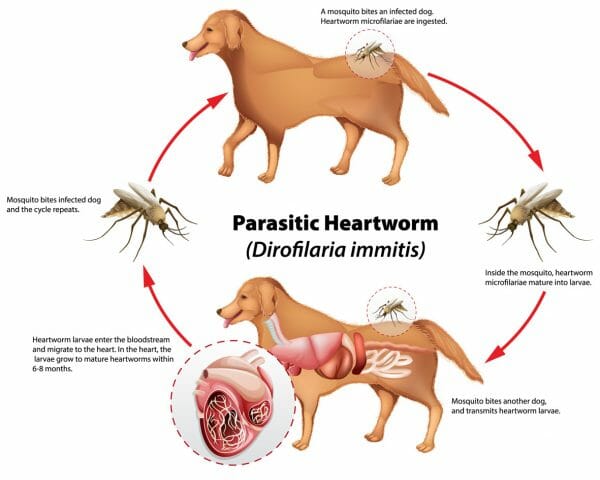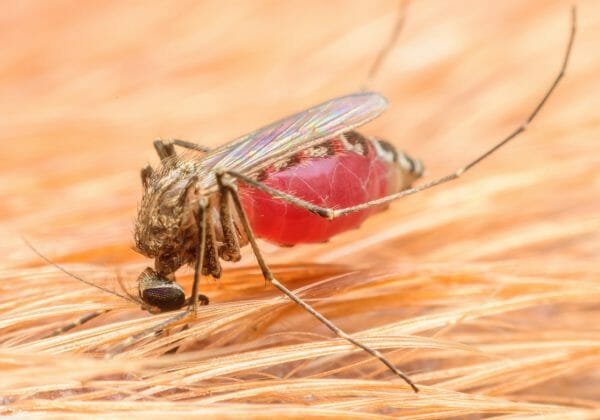Heartworm Treatment
Heartworm in dogs is an issue for pet owners throughout the United States. After the devastating event of Hurricane Katrina in 2005, a mass exodus of over 250,000 animals spread throughout the United States. Although heartworm was originally endemic to the southern coastal parts of the country, it was now being spread to all other regions. The parasite that causes heartworms is now seen in every U.S. state because of this.
Because of this new development, veterinarians throughout the country are recommending that all dogs be given monthly medication to prevent heartworm infections from mosquito bites. Starting at around 7 months of age, both puppies and older canines should be routinely administered preventative heartworm medicine prescribed by a vet.
If the dog already has the disease, heartworm treatment should be sought out as soon as possible in an attempt to rid the animal’s system of the worms. A veterinarian will be able to provide the expertise needed in every step of heartworm treatment.

Heartworm Symptoms in Dogs
Before any signs of heartworms can be identified, the worm must go through an entire cycle of life while residing inside the dog’s bloodstream. Signs of heartworms in dogs can take over five months to complete as the worms mature from eggs to adults.
This means that, following infection through the bite of a mosquito, the microfilariae will need to mature, reproduce, and then spread throughout the canine’s body to various organs. Once these vile worms reach the heart chamber, lungs, and blood vessels, they begin wreaking havoc on the dog’s body.
Once this point is reached, symptoms begin to arise. The severity and number of symptoms correspond to how many heartworms are residing within the body. If left uninhibited, these parasites can infest a canine for 5 to 7 years.

Symptoms
- Class 1: There are usually little to no symptoms present.
- Class 2: The dog may have trouble keeping up with its normal exercise levels. Some atypical coughing may be seen.
- Class 3: The canine will have great difficulty remaining physically active. Fainting, loss of weight, and a decreased desire to eat may be observed.
- Class 4: The dog is at risk of death. By now, the worms have nearly blocked blood flow and heart failure is possible. Its gums may be white and its urine may be a dark color. Emergency medical intervention is needed for survival.
It is crucial that, if any of these symptoms are being seen in consistent relation to each other, the canine be brought in for a check-up. The more advanced the heartworm infestation is, the harder it will be to treat.
How Do Dogs Get Heartworm?

Dogs get heartworms by means of a simple mosquito bite. It is the mosquitos that carry the parasite D. immitis that cause the disease. Once the parasite has found its way into the bloodstream, the lifecycle process starts and does not come to fruition for another 5 to 7 months.
After this time has passed, the heartworms are now large enough to spread to different vital organs. The worms, as they multiply continuously, begin to clog up arteries and limit blood flow to the organs. The worms themselves can get up to 12 inches long, and there can be as many as 250 in a single body. Naturally, this can make for a devastating turn of events for a canine’s health and well-being.
Can Humans Get Heartworm?
One question that may be floating around the minds of those around this poor pup is: “is it contagious?” Thankfully, this type of parasitic infection is not transmissible to humans or other animals.
A mosquito bite is the sole way for an animal or a human to develop a heartworm infection. For humans, in particular, this infection is especially rare. By the slim chance that it is contracted, it can be relatively easy to treat it.
Heartworm Medicine for Dogs
As far as heartworm treatment for dogs, there are several highly-rated options on reputable sites like Chewy.com:
- Revolution (Selamectin)
- Tri-Heart (Ivermectin)
- Iverheart Max (Ivermectin, Pyrantel Permeate, Prziquantel)
- Advantage Multi for Dogs (imidacloprid and moxidectin)
Dog heartworm medicine also works to protect the animal from other types of parasites and worms.
Although each of these heartworm medications for dogs are viable options, a veterinarian should have the final say on what the dog takes and at what dose it is taken. Dosage is based upon the canine’s weight rather than how old it is.

Prescribed Medication Only
All heartworm medications should be approved prior to administration—not only by the FDA but by the veterinarian treating the canine. Treatments concocted at home should never be used.
This disease can be fatal if treated complacently. Therefore, whether it be heartworm pills or another form of medication, it should be prescribed, monitored, and adjusted by the vet alone. This is in an effort to keep the canine as safe as possible throughout treatment.
Heartworm Prevention for Dogs
Although heartworm prevention can be done through some fairly easy steps, it takes consistency and diligence to keep up with it. Utilization of the prevention tools advised by the vet is key to keeping the pesky worms away from canines.

Preventative Measures
There are a number of measures to be followed for maximum protection against heartworms. Although not all of them are required, they are certainly recommended.
- The best way to protect against heartworm infections is to keep the dog immune to the disease through the continual administration of medication prescribed by a vet. This may be given by means of an injection, a topical medication, or a pill. No matter the method, most vets recommend these doses be given each month consistently. For the injectable medication specifically, this is given twice a year.
- If any of the signs of this disease begin to pop up, it is always best to be safe than sorry and take the dog for testing at the vet. No matter what, yearly testing for heartworms is suggested for canines of all ages.
- If the dog plays outside, try to avoid all stagnant water and mosquito-infested areas. Spraying the animal down with canine-approved mosquito repellant is ideal before going outdoors, especially in humid climates.
- Finally, always stick to what the vet recommends over any article or informational tidbit. The vet possesses the expertise as well as the personal knowledge of the canine in question to appropriately diagnose and treat it.
To learn about more dog diseases, check out dog health page and come back each week to learn more about your pet’s health or beautiful breeds of dogs.



